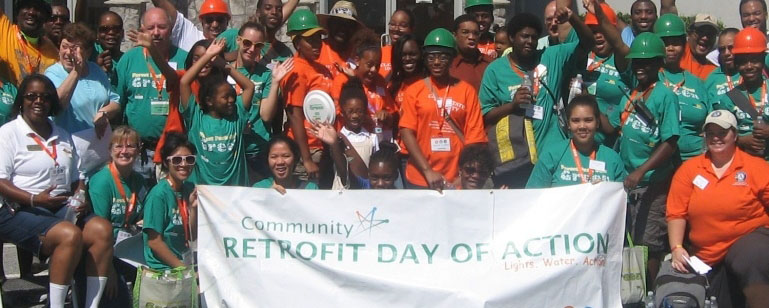(Re)trofit Design: From the Ground Up
By Sean Nicholson
William McDonough, an American architect who co-wrote Cradle to Cradle: Remaking the Way We Make Things said, “Pollution is a symbol of design failure.” Considering that pollution is causing problems like ocean acidification and climate change, the logical next question is, so how do we fix the design?
Well, to address the air emissions that contribute to climate change, you have to start where the design is the weakest; where the pollution is most damaging and often most overlooked. For example, one of the largest design failures contributing to air emissions is energy inefficient housing. In these homes, which are especially prevalent in low-income communities, energy seeps out of every nooks and cranny. This extra energy consumption adds up to more greenhouse gas emissions, higher utility bills, and adds stresses to overburdened communities who need relief the most.
Our organization, Let’s Retrofit a Million (LRAM), started as a student-led, nonprofit organization at Morehouse College, a historically black college (HBCU) in Atlanta, Ga, to help low-income communities that are disproportionately affected by climate destabilization, yet they are the least likely to receive aid. To help address the issue LRAM set up a series of service-learning opportunities in modest means neighborhoods. Our flagship program, the Community Retrofit Day of Action, has already reached more than 10,000 residents and through the program we have given out 54,000 Retrofit Efficiency Packages, containing energy efficiency and water conservation devices, free of charge to residents. These efforts have led to a total savings of $11.6 million for participating households and have offset the equivalent of more than 16 million lbs of carbon dioxide (CO2), pollution which would have resulted from producing the energy that was saved. Additionally, our distribution of water conservation devices has saved enough water to fill 548 Olympic-size swimming pools!
Through our Applied Mentorship Program for Sustainability (AMPS), we’ve used curriculum to educate metro Atlanta highschool students on how to deal with the environmental issues facing their communities. Furthermore, last year our very own “EcoTerns,” as we affectionately call them, convinced our organization to start an Urban Gardening Resiliency Oasis (UGRO). This program built and supports a community garden that serves as a green education space, a neighborhood beautification project, and provides residents with access to land where they can grow fresh produce.
Through experiential learning for both volunteers and residents, LRAM is able to heighten “environmental intelligence,” or begin to change environmental awareness into environmental action and more sustainable behaviors. I truly believe that in order to reverse our ‘design failure,’ we must face our environmental justice issues on all fronts and ensure that no one is left behind.
About the Author: Sean Nicholson is the Marketing Communications Associate for Let’s Retrofit A Million Education Fund, Inc. He began his work with LRAM as an intern in the summer of 2009, working with high school students under LRAM’s Atlanta Mentorship Program for Sustainability. After the summer, he continued volunteering with LRAM, developing a passion for environmental justice work after learning first-hand how valuable the impact of the work was in his community.
Editor's Note: The opinions expressed in Greenversations are those of the author. They do not reflect EPA policy, endorsement, or action, and EPA does not verify the accuracy or science of the contents of the blog.



Thanks so much,
Wow these young people are doing great work- definitely share more stories like this.